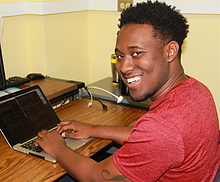 A doctoral student in the Computational Linguistics and Information Processing (CLIP) Laboratory has been awarded the Louis Stokes Alliance for Minority Participation Bridge to the Doctorate (LSAMP BD) fellowship to further his research in machine learning.
A doctoral student in the Computational Linguistics and Information Processing (CLIP) Laboratory has been awarded the Louis Stokes Alliance for Minority Participation Bridge to the Doctorate (LSAMP BD) fellowship to further his research in machine learning.
Kianté Brantley, a first-year doctoral student in computer science, is the recipient of the coveted fellowship, which is awarded by the National Science Foundation. He will receive tuition assistance, health insurance, and $30,000-a-year over the course of the next two years.
The LSAMP BD fellowship is designed to assist students in developing the skills and strategies that will guarantee their success in the fields of science, technology, engineering and mathematics (STEM). The award honors the life and legacy of U.S. Rep. Louis Stokes, the first African-American congressman in Ohio. Stokes was a champion for social and economic justice—receiving awards for his work on racial and ethnic diversity—and advocated for expanding opportunities to underrepresented individuals.
Brantley’s research interest in the CLIP lab lies in machine learning with an emphasis on deep learning. He is particularly interested in deep learning models and their applications for natural language processing (NLP) tasks.
Brantley says he is honored to receive the fellowship.
“Not only does this fellowship provide funding to support my research, but it provides a support community of other minority grad students in STEM,” he says. “It will help further my research because it provides me with the independence, flexibility and freedom to pursue my research interests.”
Brantley has worked closely with Hal Daumé III, an associate professor of computer science and director of the CLIP lab, who nominated him for the fellowship and is his academic adviser.
In his nomination letter, Daumé, who holds appointments in the University of Maryland Institute for Advanced Computer Studies (UMIACS) and the Language Science Center, said he was impressed by Brantley’s commitment to his research and career path. He notes that Brantley completed a master’s degree in computer science from the University of Maryland, Baltimore County in only one year while simultaneously working full-time for the U.S. Department of Defense.
“I am incredibly fortunate to have had the opportunity to work with Kianté over the past year, and I look forward to his continued success as a researcher and scientist,” Daumé says. “He is both an amazing junior scientist and an inspiring person.”
One of the projects Daumé and Brantley have been collaborating on is a shared task for the upcoming Empirical Methods in Natural Language Processing (EMNLP) Second Conference on Machine Translation, scheduled for Sept. 7–8, 2017 in Copenhagen, Denmark.
The task—called Bandit Learning for Machine Translation—is a framework to train and improve machine translation systems by learning from weak or partial feedback.
Brantley says he has enjoyed working on the Bandit project and adds that he is continually learning from his colleagues—both faculty and other students—in the CLIP lab.
“I collaborated with three other lab-mates on the EMNLP conference shared task, and all of my lab-mates had previous experiences building neural machine translation models and quickly got me caught up to speed,” he says. "Working with them was an awesome experience, and I look forward to more collaboration with them as my Ph.D. journey progresses.”
—Story by Melissa Brachfeld